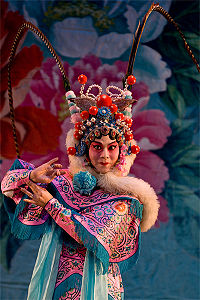Toronto 43° 39' 12.53" N, 79° 23' 2.16" W Dance Music Theatre Person
Founded by William LAU in 1994, the Little Pear Garden Collective is a federally incorporated non-profit cultural arts organization in Canada.
Mission
Our mandate is to raise the profile of professional Chinese-Canadian artists through the presentation and production of high caliber artistic programming. Members of the collective include professional artists, cultural workers, and community leaders. We are committed to preserving and promoting the richness of the Chinese performing arts to a wide range of audiences in Canada.
History of the Name
The collective’s name is derived from Peking opera’s tradition of nomenclature. During the Tang dynasty in China, approximately 712 – 755 AD, Emperor Hsuan Tsung founded the Pear Garden Academy inside his royal court, thereby establishing China’s first professional music and dance performance troupe.
This important institution is considered to be the origin of Chinese opera. Subsequently, Chinese opera has been referred to as the “pear garden profession,” and opera performers may be referred to as the “children of the pear garden.” Thus, when William LAU founded the collective to promote Canadian appreciation of Chinese performing arts, he named it the Little Pear Garden Collective.
About the Collective
Emily Cheung
As the new artistic director of LPGC, my vision is to stay true to the ideas and mission of our founder, William Lau, while at the same time evolving the artistic foundation of LPGC in bold, new and exciting directions.
While maintaining the high artistic calibre that you have come to expect from LPGC, in the very near future we will start to place an increased emphasis on creating dynamic and ground-breaking artistic collaborations and full-length productions. These new productions will aspire to introduce our audiences to a new dimension in Chinese contemporary dance and aesthetics, one that fuses ancient traditions with modern dance vocabularies to create a dance rich in creativity, color, nuance and meaning. We hope these new dance vocabularies will perfectly balance the ancient and the modern and will appeal to audiences of all cultural backgrounds. Naturally, we will also continue to embrace our Chinese traditions by introducing various educational workshops, lectures and demonstrations.
